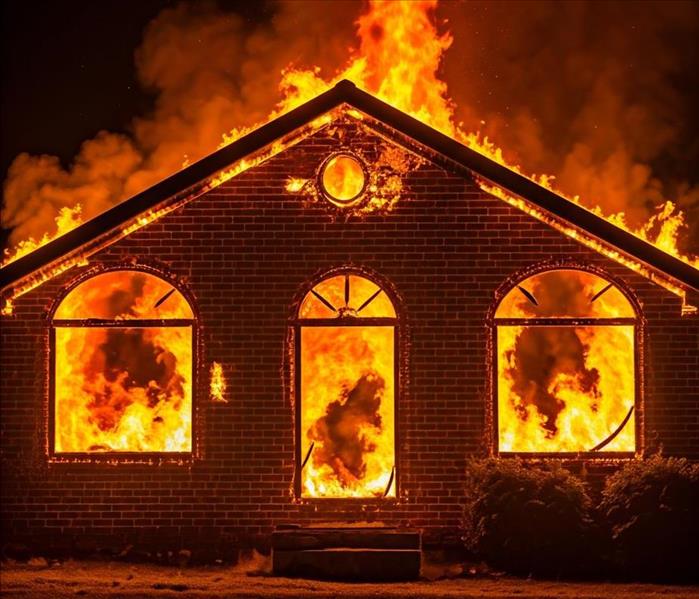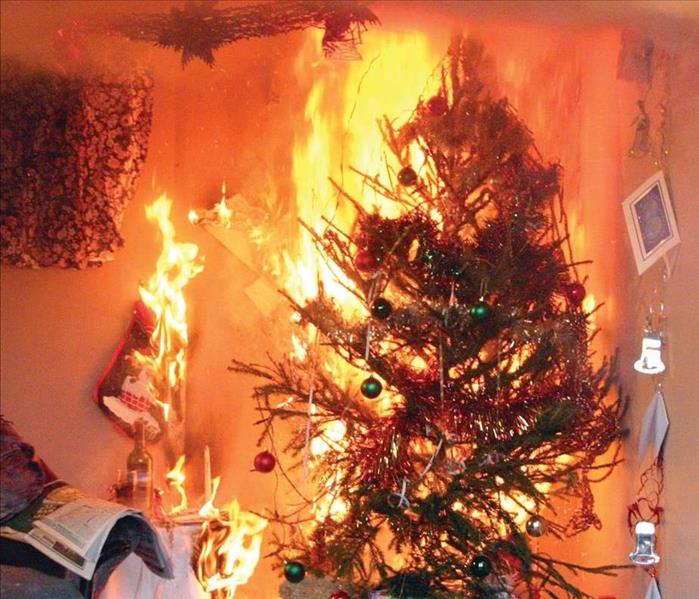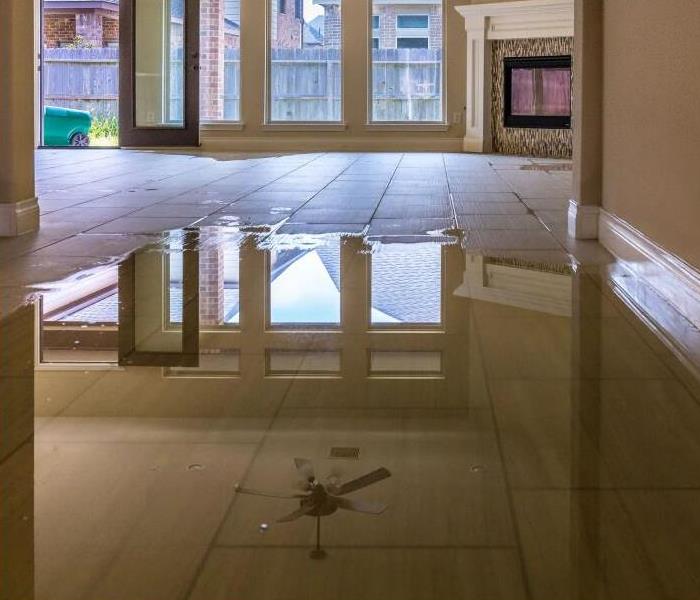Recent Posts
How to Avoid Fire Damage to Your Home During Dry Seasons
1/20/2025 (Permalink)
Dry seasons can be a dangerous time for home fires. The combination of dry weather, strong winds, and low humidity can create the perfect conditions for wildfires to spread quickly. In addition, many people use fireplaces and other heating sources more often during the dry season, which can also increase the risk of fire.
There are a number of things you can do to protect your home from fire damage during the dry season.
Here are some tips:
- Create a defensible space around your home. This means removing any flammable materials, such as leaves, branches, and mulch, from within 30 feet of your home.
- Keep your gutters clean. Clogged gutters can collect leaves and other debris, which can increase the risk of fire.
- Trim trees and shrubs near your home. This will help to reduce the risk of fire spreading to your home.
- Use caution when using fire in or around your home. This includes being careful when using fireplaces, campfires, and grills.
- Install and maintain smoke detectors and carbon monoxide detectors. These devices can help you to evacuate your home safely in the event of a fire.
- Have a fire escape plan. This will help you and your family to get out of your home safely in the event of a fire.
- Consider installing a sprinkler system. Sprinkler systems can help to extinguish fires quickly, which can reduce the amount of damage to your home.
- Be aware of fire restrictions. During the dry season, there may be restrictions on outdoor burning. Be sure to check with your local fire department before burning anything outdoors.
By following these tips, you can help to protect your home from fire damage during the dry season.
Additional tips:
- Sign up for a fire safety course. This will teach you how to prevent fires and how to escape from a fire safely.
- Install a home security system. This can help to deter burglars, who may be more likely to target homes during the dry season.
- Keep your home well-maintained. This includes repairing any leaks or other damage to your home.
- Be prepared to evacuate. If a fire threatens your home, be prepared to evacuate safely.
By following these tips, you can help to keep your home safe during the dry season.
Keep Your Holidays Fire Free
12/2/2024 (Permalink)
The holiday season is a time for joy, family, and festivities. However, it’s also important to prioritize safety. House fires are a common occurrence during this time, often caused by careless actions or faulty equipment. Here are a few tips to keep your home safe and your holidays happy:
Christmas Tree Safety:
- Choose a fresh, fire-resistant tree.
- Keep the tree well-watered.
- Place the tree away from heat sources like fireplaces and radiators.
- Turn off Christmas lights before going to bed or leaving the house.
Lighting Safety:
- Use only UL-listed lights.
- Check lights for frayed wires or broken bulbs before using them.
- Never overload outlets.
- Avoid using candles unattended.
Cooking Safety:
- Never leave cooking unattended.
- Keep children and pets away from cooking areas.
- Keep pot handles turned inward to avoid accidental spills.
- Clean up spills immediately.
By following these simple tips, you can enjoy a safe and happy holiday season.
How You Can Help Until the Professionals Get There
12/2/2024 (Permalink)
Flooding can cause significant damage to your home. While professional restoration services are the best solution for long-term recovery, there are immediate steps you can take to minimize damage until help arrives.
Here are some tips:
Safety First:
- Prioritize your safety and the safety of your family. Evacuate if instructed by local authorities.
- Avoid walking through floodwaters, as they may contain contaminants.
Document the Damage:
- Take photos and videos of the damage to your home and belongings. This documentation can be helpful for insurance claims.
Turn Off Utilities:
- If it’s safe to do so, turn off the electricity, gas, and water at the main switches to prevent further damage and hazards.
Remove Water and Moisture:
- If the water level is low, use pumps or buckets to remove water from your home.
- Open windows and doors to allow air to circulate and help dry out the affected areas.
Prevent Mold Growth:
- Remove water-damaged materials like drywall, carpeting, and insulation.
- Use fans and dehumidifiers to reduce humidity levels.
- Clean and disinfect affected areas to prevent mold growth.
Remember: It's important to contact a professional restoration company as soon as possible to assess the damage and initiate the restoration process. They have the expertise and equipment to properly dry out your home and prevent further damage.
SERVPRO Team Cuthbertson: Proud Sponsors of the Tennessee Volunteers
12/2/2024 (Permalink)
We're excited to announce that SERVPRO Team Cuthbertson is proud to be an official sponsor of the Tennessee Volunteers for the 2024-2025 season!
As a local business dedicated to restoring damage and rebuilding lives, we’re thrilled to support the Tennessee Volunteers and their passionate fanbase. We believe in the power of teamwork, resilience, and community, values that align perfectly with our own.
We’re committed to helping our community, and this sponsorship is just one way we're doing that. By supporting the Tennessee Volunteers, we're not only cheering on our favorite team, but we’re also investing in the future of our state.
About SERVPRO Team Cuthbertson: SERVPRO Team Cuthbertson is a locally owned and operated business specializing in disaster restoration and cleanup services. We're here to help you with water damage, fire damage, mold remediation, and more.
Contact us today to learn more about our services or to schedule an appointment.
Preventing Heating Fires
2/8/2024 (Permalink)
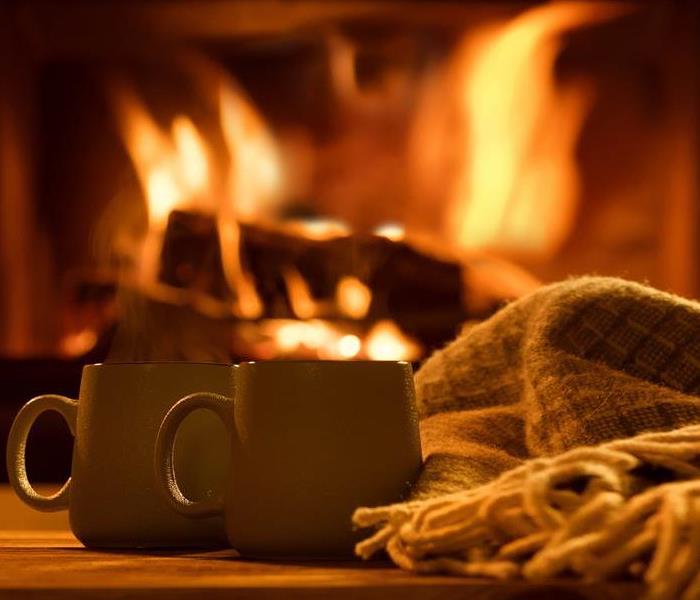 Heat your home safely this season as cold outdoor temperatures persist.
Heat your home safely this season as cold outdoor temperatures persist.
While modern heating systems are designed to be more efficient and have built-in safety features that minimize the risk of fires, it is crucial to note that heating fires can still occur due to various factors.
Is your property at risk? Let us help you get prepared with our checklist of preventative measures. But remember, if your property does undergo damage, we are open 24/7, 365 days a year to help you through it and to make it "Like it never even happened."
Overall, there has been a decline in heating fires over the years, however, they still pose a significant risk to homes and individuals. By remaining vigilant, staying informed about safety measures, and taking proactive steps to maintain heating systems, we can continue to reduce the occurrence of these devastating incidents.
Checklist for preventing heating fires
- Heat source proximity - Keep anything that can burn at least three feet from all heat sources including fireplaces, wood stoves, radiators, portable heaters, or candles.
- Electrical issues - Always plug space heaters directly into an outlet, and make sure its cord isn’t damaged or frayed.
- Improper usage - Never use an oven to heat your home.
- Maintenance - Maintain heating equipment and chimneys by having them cleaned and inspected each year by a professional.
- More information - Visit the U.S. Fire Administration Home Fires page to learn about how to prepare for and prevent home fires including tips for individuals with disabilities and older adults.
source: Ready.gov
Was this helpful? Leave us a review to let us know!
https://www.wereyouhappy.com/review2/SERVPRO-of-west-knoxville
SERVPRO Team Cuthbertson in the 2023 Oak Ridge Christmas Parade
12/19/2023 (Permalink)
 SERVPRO employees waive to spectators in the 2023 Oak Ridge Christmas Parade
SERVPRO employees waive to spectators in the 2023 Oak Ridge Christmas Parade
Our community is where our heart is and that’s why we like to invest our time and efforts in events like the Oak Ridge Christmas Parade. Each year, individuals, families, and businesses come together to celebrate the Christmas holiday with festive floats and decorated trucks and trailers. The streets are lined with spectators, including children who cheer, sing, and wave as the parade of brightly lit and decorated floats pass by. Holiday music can be heard all around, and Christmas Cheer is evident in the faces of all throughout the parade.
This year’s event, ?sponsored by the Oak Ridge Chamber of Commerce, was attended by hundreds of spectators and, according to Norm Nelson of the Oak Ridge Chamber, the 2023 parade boasted one of it’s largest float registrations in recent years.
Several news outlets were in attendance with live coverage of the event being broadcasted and recorded. One of these recordings can be viewed on the following Youtube link: https://www.youtube.com/watch?v=KWJxIHfUwoo
It is an honor to participate in family events like this one, and it is a testament to our community that it is such a huge success every year. The hard work and dedication of the people like Christine Michaels, Norm Nelson, and BreAnna Robinson of the Oak Ridge Chamber of Commerce are the driving force behind these great celebrations, which enrich and inspire this community that we are humbled and grateful to be a part of.
Fire Prevention for Homes and Businesses
12/7/2023 (Permalink)
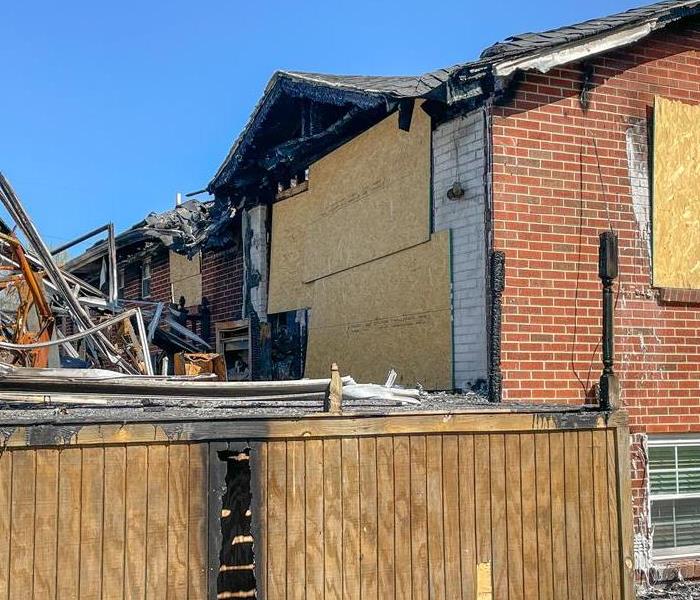 The effects of a fire can be devastating.
The effects of a fire can be devastating.
If you didn't know, it's National Fire Prevention Week. As much as we here at SERVPRO are here to help clean up after fires, our priority is always to help prevent them in the first place. So, we want to share some tips with you that will help keep you and your loved ones safe.
Fire is one of the most devastating disasters that can strike a home or business. It can cause extensive damage to property and possessions, and can even lead to loss of life. That's why it's important to take steps to prevent fires from happening in the first place.
Here are some fire prevention tips for homes and businesses:
Home fire prevention tips:
? Install smoke alarms on every level of your home, inside bedrooms and outside sleeping areas. Test your smoke alarms every month and change the batteries every year.
? Create and practice a fire escape plan with your family.
? Keep flammable materials away from heat sources.
? Be careful when cooking and using candles.
? Never smoke in bed.
? Have your electrical wiring and appliances inspected regularly by a qualified electrician.
Business fire prevention tips:
? Install smoke alarms and carbon monoxide detectors throughout your business. Test your alarms every month and change the batteries every year.
? Create and practice a fire escape plan with your employees.
? Keep flammable materials away from heat sources and electrical equipment.
? Be careful when using appliances and equipment.
? Have your electrical wiring and appliances inspected regularly by a qualified electrician.
How SERVPRO can help after a fire
If a fire does happen, it's important to call a qualified fire restoration company as soon as possible. SERVPRO is a leading provider of fire restoration services. We have over 2,000 franchises across the United States and Canada, so we're always nearby to help when disaster strikes.
Our team of highly trained and experienced professionals is equipped to handle all aspects of fire restoration, including:
? Emergency water removal
? Structural drying
? Smoke and odor removal
? Content cleaning and restoration
? Construction services We work with your insurance company to make the claims process as easy and stress-free as possible. We also offer 24/7 emergency service, so you can always count on us to be there for you when you need us most.
If you have experienced a fire, contact SERVPRO today. We're here to help you get your home or business back to normal as quickly as possible.
Additional fire prevention tips:
? Educate your family and employees about fire safety. Make sure everyone knows what to do in case of a fire.
? Have a fire extinguisher on every level of your home or business and know how to use it.
? Keep your fire extinguishers in good working order by inspecting them regularly and having them serviced by a professional.
? Consider installing a fire sprinkler system. Fire sprinkler systems can help to extinguish fires quickly and prevent them from spreading.
By following these fire prevention tips, you can help to protect your home or business from the devastating effects of fire.
Ensuring Turkey Fryer Safety for a Happy Thanksgiving
12/7/2023 (Permalink)
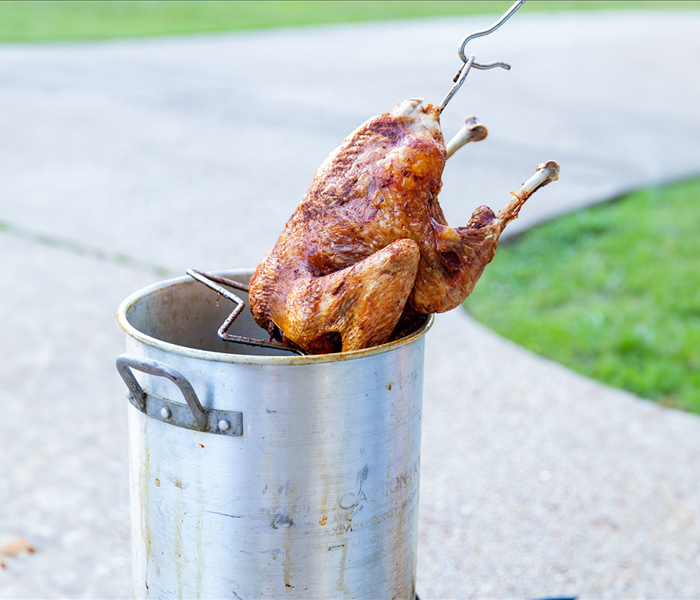 Be sure to use our safety tips to help prevent a fire with using a turkey fryer.
Be sure to use our safety tips to help prevent a fire with using a turkey fryer.
Thanksgiving is a time for family, friends, and of course, a delicious turkey feast. While many families enjoy the tradition of deep-frying their turkeys, it is important to be aware of the potential safety hazards involved. SERVPRO, a leading provider of fire damage restoration services, is committed to helping families have a safe and enjoyable Thanksgiving by providing turkey fryer safety tips.
Turkey Fryer Safety Tips
- Choose the Right Fryer: Always use a turkey fryer specifically designed for outdoor use. Never use an indoor turkey fryer, as they pose a high risk of fire.
- Use a Safe Location: Place your turkey fryer at least 10 feet away from any structures or combustible materials. Never operate a turkey fryer in a garage, shed, or any enclosed area.
- Keep Away from Flammables: Keep any flammable materials, such as propane tanks, gasoline, or lighter fluid, away from your turkey fryer.
- Fill with Proper Oil: Use only the recommended type of oil for your turkey fryer. Never overfill the fryer, as this can increase the risk of overflowing.
- Thaw the Turkey Completely: A partially frozen turkey can cause the oil to splatter and ignite. Always thaw your turkey completely before frying.
- Lower the Turkey Slowly: Slowly lower the turkey into the hot oil to avoid splattering.
- Never Leave the Fryer Unattended: Never leave a turkey fryer unattended while it is in operation. Always have a fire extinguisher nearby in case of an emergency.
- Dispose of Oil Properly: Once the turkey is cooked, allow the oil to cool completely before disposing of it. Never pour hot oil down the drain.
SERVPRO's Commitment to Safety
SERVPRO is committed to helping families have a safe and enjoyable Thanksgiving by providing turkey fryer safety tips and fire damage restoration services in case of an emergency. With over 50 years of experience, SERVPRO has the expertise and resources to help you recover from a fire quickly and efficiently.
Enjoy a Safe and Happy Thanksgiving
By following these turkey fryer safety tips, you can help prevent fires and ensure a safe and happy Thanksgiving for you and your family. SERVPRO wishes you a safe and enjoyable Thanksgiving!
How Many Smoke Alarms Should You Have
12/12/2022 (Permalink)
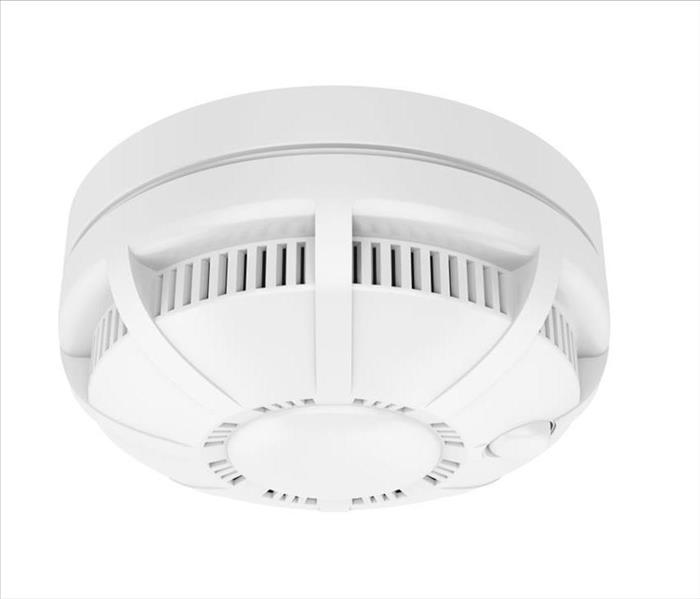 Ionization alarms tend to be better at detecting fast-burning fires
Ionization alarms tend to be better at detecting fast-burning fires
Keeping your home safe from the threat of fire can be a tricky proposition. After all, fires don't always happen when you're home — so how can you keep yourself and your loved ones safe? One simple way is to install smoke alarms in each room of your house. But how many smoke alarms should you have? And where should they go? Read on for answers to these questions, plus tips for choosing the best type of alarm for your home.
How many smoke alarms should I have in my home?
The National Fire Protection Association (NFPA) recommends that you have at least one smoke alarm on every level of your home, including the basement. The NFPA also recommends placing one outside each sleeping area and in each bedroom.
Additionally, there should be one smoke alarm in the kitchen and another in your basement or other areas below grade level. This is especially important for older homes with original wiring and electrical panels that could be easily damaged by water or fire.
Where should smoke alarms be installed?
The number of smoke alarms you should have depends on the layout of your home and how many sleeping areas you have.
If you live in a multi-story apartment building or condo building with an elevator or staircase, follow these guidelines:
Install at least one ionization or photoelectric/photoionization combination smoke detector per floor. You can add additional alarms if desired; this is up to local code requirements for multi-family residences (not just single-family houses).
All bedrooms should be within 10 feet of a functioning smoke detector, regardless of which type it is (i.e., ionization or photoelectric/photoionization combination). If this does not work for some reason (e.g., if there is already another working unit installed), consult with local fire officials about alternative solutions that would still meet safety regulations while also allowing for proper functioning of all other devices throughout restful periods such as nighttime when most people are asleep anyway so alarms aren't going off every time someone sneezes while watching TV before bedtime
What type of smoke alarm should I install?
You should have both ionization and photoelectric smoke alarms in your home. The reason is that both types of detectors can help you detect a fire and alert you to the danger more quickly. Ionization alarms tend to be better at detecting fast-burning fires, while photoelectric alarms are better at detecting slower burning fires.
However, there are some exceptions to this rule:
- If you live in an apartment building, landlords must install ionization smoke detectors only if they want their tenants to receive federal assistance for housing. In either case, it’s up to state laws where landlords will be required (or not) to install both types of detectors.
- If you live in a mobile home or trailer park, it’s recommended that all homes have dual-sensor technology installed by law. This includes ionization and photoelectric devices which will protect residents against both fast-burning house fires as well as small cooking fires that may start on stoves or hot plates
Houses with more than one story should have at least one smoke alarm on each level, as well as in each bedroom. If you're building a new home or renovating an existing one, make sure there are enough smoke detectors and they are working properly before moving in.
The Responsible Host’s Fire Safety Guide for Thanksgiving Day
11/17/2022 (Permalink)
Being aware of the possibility of fires, practicing safety measures to prevent fires, and knowing what to do in the event of a fire are important responsibilities for anyone who is hosting a Thanksgiving celebration.
As you prepare for the upcoming Thanksgiving Holiday and begin to plan the details for your gathering, be it big or small, exuberant or relaxing, there are several safety tips to keep in mind to promote a safe environment for you, your family, and/or your friends (and your furry family too!).
How likely am I to have a fire on Thanksgiving Day?
According to The U.S. Fire Administration, cooking fires cause the most Thanksgiving Day fires in residential buildings, occurring more often on Thanksgiving Day than any other day of the year. On Thanksgiving Day, 74% of fires in residential buildings were caused by cooking followed by 8% of fires caused by heating. By comparison, cooking caused 51% of residential fires that occurred on all days of the year other than Thanksgiving. Over half (54%) of Thanksgiving Day fires occur between 10 a.m. and 5 p.m. when people are preparing Thanksgiving dinner.
Tips for preventing kitchen fires.
- Never leave your range or cooktop unattended while cooking. If you have to leave the room, turn your range or cooktop off.
- Wear short, close-fitting or tightly rolled sleeves. Loose clothing can hang down onto hot surfaces and can catch fire if it comes in contact with a gas flame or electric burner.
- Keep your cooking area clean and free of combustible materials. Food wrappers, oven mitts or other materials left on or near the stove may catch fire.
- Be sure to clean up any spilled or splattered grease. Built-up grease can catch fire in the oven or on the cooktop.
- Keep a fire extinguisher readily available. Having an extinguisher nearby is important, but you also need to have the correct type of extinguisher and know how to properly use it.
- Never throw hot grease in the garbage as it can ignite combustible materials. Be sure to let grease cool and consider disposing it in an old can, such as a metal coffee can.
- Do not store food or other items in your oven. It can be easy to forget there is an item in your oven, and this could catch fire while preheating.
What to Do If a Cooking Fire Flares Up
By exercising caution in your kitchen, you can help reduce the risk of a kitchen fire. But if a fire does flare up, you need to be prepared.
- Your safety comes first. If you cannot safely extinguish the fire, leave the scene, call 911 for help, and let the fire department control the fire.
- If a small fire flares up and you are going to try to extinguish it, call 911 for help first. A fire may grow out of control more quickly than you anticipate. It is safer to have help already on the way.
- Smother a grease fire – never throw water on a grease fire. The water can be superheated and change to steam, and can cause severe burns. Also, it can cause oil to splash up and spread the fire. If a grease fire starts in a pan, smother the flames by sliding the lid – while wearing an oven mitt – over the pan. If it is safe to do so, turn off the heat source. Do not move the pan; keep the lid on until the fire is out and the pan is completely cool.
- If a fire starts in your oven, KEEP THE DOOR CLOSED & TURN OFF THE HEAT SOURCE. Keeping the door closed will help smother the flames. Do not open the door until the flames are completely out.
- If a fire starts in your microwave, turn off the microwave and do not open it until the fire is completely out. Unplug the microwave only if you can safely do so.
With these safety precautions in place and the knowledge of how to handle a kitchen fire, you are one step closer to being a responsible host.
Cheers and Happy Thanksgiving
to all of you responsible hosts out there!
From SERVPRO of North Knoxville
Was this helpful? Leave us a review to let us know!
https://www.wereyouhappy.com/review2/SERVPRO-of-north-knoxville






 24/7 Emergency Service
24/7 Emergency Service
